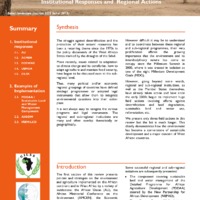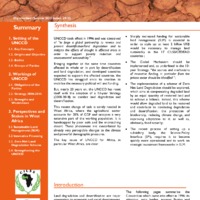Recherche
2 items
Desertification and climate change institutional responses and regional actions
The struggle against desertification and the protection of their natural resources has been a recurring theme since the 1970s in the policy documents of the West African States marked by the droughts of the Sahel. More recently, issues related to adaptation to climate change and its corollaries, how to adapt agriculture and maintain food security, have begun to be discussed even at the subregional level. Thus, many political and/or economic regional groupings of countries have defined strategic programmes or adopted legal instruments that allow them to integrate environmental questions into their action plans. It is not always easy to navigate the various programs and legal instruments. The regional and sub-regional institutions are many and often overlap thematically or geographically. Introduction The first section of this review presents policies and strategies on the environment and agriculture implemented on the African continent and in West Africa by a variety of institutions: the African Union (AU), the African Ministerial Conference on the Environment (AMCEN), the Economic Community of West African States (ECOWAS), the West African Economic and Monetary Union (UEMOA), and the Permanent Interstates Committee for Drought Control in the Sahel (CILSS). However difficult it may be to understand and to coordinate between these regional and sub-regional programmes, their very proliferation affirms the growing importance that the environment and its interdisciplinary nature has come to occupy since the Millenium Summit in 2000, where it was treated in isolation as one of the eight Millenium Development Goals (MDG). However, going beyond mere words, regional and sub-regional institutions, as well as the Member States themselves, have already taken action and have since the early 2000s begun to implement huge field actions involving efforts against desertification and land degradation, sustainable land and water use, reforestation, etc. We present only three field actions in this review but the list is much longer. This clearly demonstrates how the environment has become a cornerstone of sustainable development and a major concern of West African countries
United nations convention to combat desertification (UNCCD) : State of play and perspectives for west africa
UNCCD took effect in 1996 and was conceived of "to forge a global partnership to reverse and prevent desertification/land degradation and to mitigate the effects of drought in affected areas in order to support poverty reduction and environmental sustainability." Bringing together at the same time countries affected in whole or in part by desertification and land degradation, and developed countries expected to support the affected countries, the UNCCD has struggled since its creation to mobilise the necessary political will and funding. But, nearly 20 years on, the UNCCD has reset itself with the adoption of a 10-year Strategy (2008-2018) to combat land degradation and desertification. This recent change of tack is sorely needed in West Africa, where the agricultural sector accounts for 35& of GDP and occupies a very extensive part of the working population. It is handicapped by poor soils and the encroaching desert. These phenomena are exacerbated by already very perceptible changes to the climate and powerful demographic pressures. The key issues of UNCCD for Africa, in particular West Africa, are clear: Introduction Land degradation and desertification are major constraints to economic and social development. Inspired by that realisation, African, Latin American, and Mediterranean leaders called into being the UN Convention to Combat Desertification (UNCCD). Translation: Peter Gaechter, SOS Sahel Sharply increased funding for sustainable land management (SLM) is essential in order to scale up: at least 2 billion US$ would be necessary to manage land sustainably in the 17 CILSS/CEDEAO countries ; The Global Mechanism should be implemented and, as underlined in the 10year Strategy, “the sources and mechanisms of innovative funding, in particular from the private sector should be identified ”; The implementation of a scheme of Zero Net Land Degradation should be explored, which aims at compensating degraded land by an equal quantity of restored land and to achieve a balance. Indeed, this scheme would allow degraded land to be restored and contribute to combating degradation and desertification, the protection of biodiversity, reducing climate change, and improving adaptation to it, as well as, obviously, food security; The recent process of setting up a subsidiary body, the Science-Policy Interface (SPI), requires it to become quickly more operational and to work on strategic investment frameworks in SLM.

